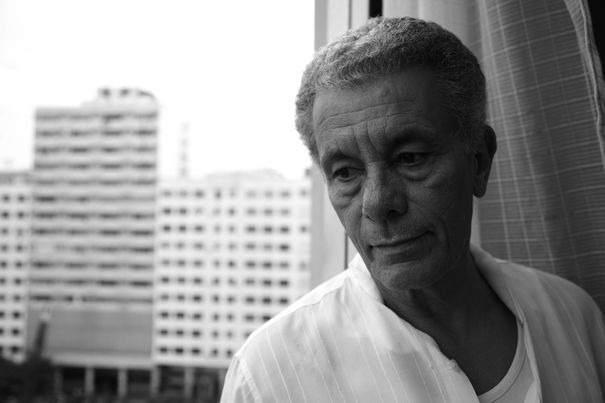A film about an anonymous man's footsteps
Talent Press Guadalajara participant Mabel Machado reviews Eryk Rocha's laureate first film PASSERBY (TRANSEUNTE).

Eryk Rocha's PASSERBY
The story happens in Rio de Janeiro, “a city with more people than flies” as Rubem Fonseca once wrote. The nearly choreographical coming and going of pedestrians on the avenues simulates the violent streams of many superimposed rivers, while Expedito takes the liberty to retrace his footsteps in a lost direction. It would seem that his name had given him the privilege of walking as if nothing really mattered. Due to his odd presence on this world (or for his singular existence out of it), he has been chosen to be the main character of Eryk Rocha's laureate first film, PASSERBY.
Expedito, who is in his fifties or sixties, lives alone in a small apartment. The only people he talks with are the teller of the bank he withdraws his pension from, a cab driver (Djavan), and the only niece he receives a birthday gift from. From the first sequence, we can see that he starts a tacit and innermost conversation with his past; this seems to be the best way he has found to live a life with no children nor grand children. First, he goes to his mother's grave and then he goes on along with his ill-fated luck of nocturne bolero. The black and grey color scheme of this film has allowed the filmmakers to walk between the two psychological times and the contrast of Expedito's life, as well as to freely mix together fictional scenes and the documentary moments of the film.
The battery radio the main character carries during his journeys along the city and even at home, reinforces the anachronism of the character and acts as the main leitmotif of the story. Besides the narrative function of this element – that appears as well within the soundtrack as it will be explained later – Rocha has chosen the radio to act as a connection between Expedito and the life of the others, as well as to start living his own life through everyone else's.
Old, isolated, with no books written yet, neither possessions nor descendants, Expedito is one among millions of atomic particles of ephemeral dust of humanity. He’ll live in this world and pass unnoticed by history, he doesn’t disturb anyone. He is happy watching from the distance either an argument or a hug between a couple; the skirt or the hair of a woman; someone else's birthday cake; Adriano's goal or the Flamengo fans at the Maracaná… He can even bear the noise of the cranes which lay the foundations for three buildings in front of his window.
Because of music, Expedito is conscious of his solitude and his lethargy; he puts in his shut mouth the melancholic song of the lonely passerby. However, it is the music that takes the film out of close-ups and out of focus from the very beginning. In this way, it also saves the main figure from the daily torpor which sets the rhythm of his days. The preacher found by Expedito acts as a metronome as well, he also finds the way out of the ossuary in which his mother's mortal remains are buried after the exhumation.
Using religious symbols, we can think that it is in this moment when Expedito achieves his final redemption – PASSERBYis a film bursting with symbols. From this moment on, Glauber Rocha’s son looks for a solution for the psychological conflict expressed at the beginning of the film, which ends in a desolate street, like the one of “Paseo nocturno” in Rubem Fonseca's crowded Río.

